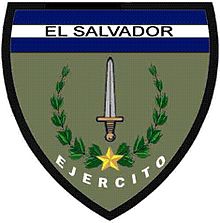Army of El Salvador
| Salvadoran Army | |
|---|---|

Badge of the Salvadoran Army.
|
|
| Active | 1824–present |
| Country | El Salvador |
| Branch | Army |
| Size | 14,165 |
The Salvadoran Army (Spanish: Ejército Salvadoreño) is the land branch and largest of the Armed Forces of El Salvador. In 2006 the government of El Salvador approached the Israeli ambassador to El Salvador seeking assistance in modernising its army.
The Football War (also called The Soccer War or 100-hours War) was a term coined by Polish reporter Ryszard Kapuściński to describe a brief conflict between El Salvador and neighbouring Honduras. He argued that the war began after the rival nations traded wins during the qualifying round for the 1970 FIFA World Cup. But this event was not the cause of the war. Tensions had been mounting between both nations for several years because of immigration and economic problems, resulting on the war in 1969. The soccer matches incidents just one of several events that happened during that time. Longstanding tensions between the countries were heightened by media reports on both sides, each accusing the other of hooliganism and violence toward their own football fans. On June 26, 1969, El Salvador dissolved all ties with Honduras, the events where used as a call for nationalist pride for both governments and the media.
On July 14 Salvadoran forces began moving rapidly into Honduras following a series of border clashes. Their progress halted after the Organization of American States (OAS) and the United States brought heavy diplomatic pressure to bear on both governments in an effort to effect a cease-fire.
A ceasefire was ultimately negotiated and signed by July 18, with Salvadoran forces withdrawing from Honduras by August 2 following guarantees of safety for Salvadoran citizens in Honduras by the Honduran government.
By the late 1970s, longstanding socio-economic inequality, human rights violations and the unwillingness of the National Conciliation Party dictatorship to address these problems led to the growth of a social movement. The government responded by assassinating thousands of political opponents and massacring students and protestors on several occasions. The heavy handed response of the government signaled to those identifying with the social movement that peaceful solutions were futile, which led to the growth of an insurgency.
On 15 October 1979, the military government was deposed by a joint military-civilian government calling itself the Revolutionary Government Junta of El Salvador or JRG. The JRG's policies were met with opposition from the military and economic elites and government repression increased, with tens of thousands of civilians being killed in 1980 and 1981 alone. This led to the formation of the FMLN, which brought on a twelve year civil war.
...
Wikipedia
